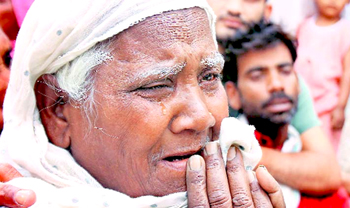Moga, May 1: A day after a minor girl died after being allegedly molested and thrown off a running bus belonging to the ruling Badal family in Punjab, the police on Thursday arrested four persons, including the bus driver, conductor and helper. The victim’s mother also suffered injuries after she was reportedly thrown off the bus too.
 According to reports, the incident took place near Gill village on Moga-Kotkapura road, late on Wednesday. The bus belongs to Orbit Company, owned by Orbit Aviation Pvt Ltd, of which Deputy Chief Minister Sukhbir Badal is a co-owner.
According to reports, the incident took place near Gill village on Moga-Kotkapura road, late on Wednesday. The bus belongs to Orbit Company, owned by Orbit Aviation Pvt Ltd, of which Deputy Chief Minister Sukhbir Badal is a co-owner.
While Chief Minister Parkash Singh Badal admitted that the bus belonged to a company owned by his family, but said he personally “never took interest” in its affairs, Punjab DGP Sumedh Singh Saini ruled out any questioning of the owners of Orbit Aviation Pvt Ltd, including Sukhbir Badal.
Describing the incident as “very unfortunate and sad”, the CM said, “Law will take its course. A case of murder has been registered and other sections have been added on the basis of the statement made by the injured woman.”
The victim, Arshdeep Kaur, 13, was travelling with her mother Shinder Kaur, 35, and brother, Akashdeep Singh, 15, from Moga to Bathinda when she was allegedly molested.
Speaking to The Indian Express at the Civil Hospital in Moga, Akashdeep said: “My mother and sister were sitting in the rear seats. At first, the bus conductor and his helper started misbehaving with my sister. They touched her and passed comments. Later, a third man who boarded the bus at Baghapurana toll plaza also joined them.”
Akashdeep said his mother called for help, but none of the passengers responded. “I tried to help them but one of the men caught hold of me… There were about eight or 10 passengers, including some women. Nobody helped us. When my sister and mother continued to resist, they pushed my mother out of the rear door, and then immediately pushed my sister out also,” he said.
When he saw his mother and sister being pushed out, Akashdeep said he jumped out of the bus too. He saw his sister lying unconscious on the road. “I borrowed a phone from a person passing by and called up my father,” he said, adding that both his sister and mother had suffered head injuries. They were rushed to the Moga Civil Hospital, where the girl was declared dead.
“They were touching my daughter on her chest, on her hands… She was crying for help. I tried to help and asked the driver to stop them. Nobody listened. There were other passengers, but nobody helped. As I tried to stop them, they made obscene gestures and laughed. My daughter was being harassed continuously… they then threw us out of the bus,” said Shinder Kaur.
Her husband, Sukhdev Singh, a labourer, said he would not allow a post-mortem till the police arrested all the accused and named the driver in the FIR.
“The bus belongs to the Badals… We demand action against the bus driver. We will not perform the last rites till the driver is booked,” said the victim’s grandmother, Surjit Kaur.
According to the FIR, however, Shinder Kaur said in her statement that the scuffle with the conductor started over tickets. The bus driver, Ranjit Singh, conductor Sukhwinder Singh, helper Gurdeep Singh, and the fourth accused Amarjeet Singh have been arrested. The last three have been charged under Sections 302 (murder), 307 (attempt to murder) and 354 (molestation) of IPC.
“We have arrested the driver as investigations revealed that he did not stop the bus when the incident occurred,” said Moga SSP J S Khaira.





Comments
Add new comment